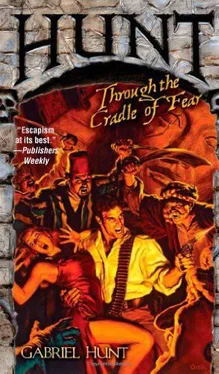Gabriel Hunt - Hunt Through the Cradle of Fear
Здесь есть возможность читать онлайн «Gabriel Hunt - Hunt Through the Cradle of Fear» весь текст электронной книги совершенно бесплатно (целиком полную версию без сокращений). В некоторых случаях можно слушать аудио, скачать через торрент в формате fb2 и присутствует краткое содержание. Год выпуска: 2011, Издательство: Dorchester Publishing Co., Inc., Жанр: Старинная литература, на английском языке. Описание произведения, (предисловие) а так же отзывы посетителей доступны на портале библиотеки ЛибКат.
- Название:Hunt Through the Cradle of Fear
- Автор:
- Издательство:Dorchester Publishing Co., Inc.
- Жанр:
- Год:2011
- ISBN:нет данных
- Рейтинг книги:3 / 5. Голосов: 1
-
Избранное:Добавить в избранное
- Отзывы:
-
Ваша оценка:
- 60
- 1
- 2
- 3
- 4
- 5
Hunt Through the Cradle of Fear: краткое содержание, описание и аннотация
Предлагаем к чтению аннотацию, описание, краткое содержание или предисловие (зависит от того, что написал сам автор книги «Hunt Through the Cradle of Fear»). Если вы не нашли необходимую информацию о книге — напишите в комментариях, мы постараемся отыскать её.
Hunt Through the Cradle of Fear — читать онлайн бесплатно полную книгу (весь текст) целиком
Ниже представлен текст книги, разбитый по страницам. Система сохранения места последней прочитанной страницы, позволяет с удобством читать онлайн бесплатно книгу «Hunt Through the Cradle of Fear», без необходимости каждый раз заново искать на чём Вы остановились. Поставьте закладку, и сможете в любой момент перейти на страницу, на которой закончили чтение.
Интервал:
Закладка:
He finished loading the cylinder just as the crate next to his was loudly pushed aside, smacking into the inner wall of the plane’s hull with a jolt that made Gabriel hope it contained something less explosive than the one he was in. His was the next to move, and he lay still when it did, not wanting to draw any attention.
Once they were down the ramp, Gabriel gently raised the cover of the crate again, hoping for some glimpse that would tell him where they were, but beyond a blinding ring of magnesium vapor lights he could see nothing at all, just solid black. It was nighttime wherever they were, and except in your major cities, nighttime tended to look much the same from place to place—especially when you could only see a sliver of it.
Then a streak of red satin passed in front of him. He craned his neck to keep it in view as long as he could, but it was gone in an instant, followed close behind by the rougher folds of a long overcoat. “Keep moving,” came Andras’ voice, though whether he was talking to Sheba or the men loading the crates, Gabriel couldn’t guess. In any event, both kept moving, and within minutes all the crates were on trucks and tearing along a road that seemed paved but just barely so—Gabriel felt every pit and gully in the surface as they passed over it.
But at least they were on their way. Gabriel settled back for the ride.
They unloaded him, along with the other crates, a bit more than an hour later—Gabriel’s cellphone may have died and its clock with it, but the luminous dial of his wristwatch, made in 1945 and only repaired once since, was still giving off its pale glow. Sometimes, he thought, the old technologies were better.
The texture of the ground under the wheels of his crate changed after a minute, from solid to…something less than solid, almost as though they’d left pavement for dirt, or not even dirt—it seemed looser, somehow. And the sound was different as they passed over it.
After a time, they came to a stop. All around him, Gabriel heard men walking rapidly, but barely any conversation, only the occasional order issued in a low bark. His crate was jostled once by another and then shifted to a new location a few yards away. A peek outside showed more crates around him, some stacked two or three high—he at least could be grateful that so far nothing had been stacked on top of his.
A car pulled up then, not in his sight, but in his hearing. The door opened and slammed shut, and a new set of footsteps approached. A set with three beats to it rather than two: slap, slap, click; slap, slap, click. Gabriel tensed at the sound.
“Well, well,” Lajos DeGroet’s voice came, from perhaps twenty feet away. “Well, well, well. My dear girl. So good to see you again.”
“Who the hell do you think you are,” Sheba said, sounding far more measured and reasonable than Gabriel thought he would in her place, “that you can kidnap a woman off the streets of New York City, fly her halfway around the world, and, and…”
“That’s all right, my dear. Let it out. You are angry and I don’t blame you.”
“You don’t blame me? You don’t blame me?”
“No, don’t hold her back,” DeGroet said, apparently to one of his men, perhaps Andras, “let her go. She won’t attack me. She knows better than that.” Gabriel heard a click followed by the sound of metal sliding against metal, and he knew DeGroet had turned the grip of his iron walking stick and drawn from within the modified fencing saber it hid. “Don’t you, my dear?”
Lajos DeGroet, son of a Dutch father and a Hungarian mother, both from artistocratic families with wealth and property to burn, had led the unproductive life his parentage entitled him to—with one exception. In his youth he’d gravitated toward the sport of fencing and at age twenty he’d competed for Hungary in the summer Olympics in Rome. He’d won a silver medal that year but famously refused to accept it; four years later, after intensive training under the great Hungarian fencing master Rudolf Kárpáti, himself a six-time gold medalist, DeGroet had returned from Tokyo with a gold.
After that, DeGroet had largely vanished from the public eye, returning to his family’s customary pastimes of accumulating and squandering money in spectacular but private fashion. Gabriel had crossed paths with him more than once, since the man was an inveterate collector—the acquisitive sort who can’t stop raising his paddle at an auction and, because of the resources at his command, never has to. Which was fine if you were on the selling end of a transaction, as Gabriel had been more than once—there’d been the gilt ceremonial bowl from Myanmar and the skull fragment from central Africa. But if you were competing with DeGroet to buy something, you might as well pack up and go home, and Gabriel had discovered that as well. The trust that underlaid the Hunt Foundation was considerable, containing as it did all the many millions of dollars his parents’ bestselling books had brought in over the years (a rich enough haul during their lives, but an absolute flood after their disappearance at sea in 2000 landed them on the front page of every newspaper in the world)—but there were fortunes and there were fortunes, and Gabriel could have bankrupted the Hunt family fortune twice over without making a dent in DeGroet’s.
So: a collector, of gold medals and golden artifacts and gold itself, no doubt, as well as all the other forms in which wealth could be stored or expressed; also a fencer, one of the best Hungary had ever fielded, which was another way of saying one of the best the world had ever seen; and though the man was nearing seventy now and had lost some height and some hair over the years, he’d lost not a bit of his old quickness or his skill with a blade. Or his arrogance, or his bad temper. He didn’t walk with a stick because, being old, he needed help with his balance. He did it to ensure he could always keep a sword close at hand.
“Now, my dear,” DeGroet said, in a voice whose attempt at sounding friendly was as unctuous as it was unconvincing, “as I had been about to tell you when your meddlesome friend insisted on seizing you from my care back at Balaton, I am a great admirer of your work. I have read all your papers. Your work on the iconography of the ancient world is not just accomplished, in my opinion it is groundbreaking.”
“You didn’t bring me here at gunpoint,” Sheba said, through what sounded like clenched teeth, “to compliment my scholarship.”
“On the contrary. That is precisely what I did. Andras, please, show her over here.” There was a brief flurry of footsteps and the voices, when they resumed, were further away. Gabriel thought this might be a good time to get out of the crate and quietly pressed upward with his knees until the latches popped. He climbed over the side, dropped lightly to the ground, looked around. But he was hemmed in by crates on all sides, so he couldn’t see a thing.
“…you see, Miss McCoy,” DeGroet was saying, “I have need of someone with your particular expertise. Some light, please, Andras. No, here.” A faint orange glow lightened a portion of the dark sky in the direction the voices were coming from. “Can you read that, my dear?”
“I don’t need to read it,” Sheba said. “I know what it says.”
“How foolish of me, of course you do. But just to humor me, could you perhaps tell us what it says.”
“It’s the story of the prince’s dream,” Sheba said. “How he came here and fell asleep at noon, with the sun overhead, and a voice spoke to him from heaven saying, ‘I am your father and you are my son, I shall give you dominion over the land and all those who live within its borders, if you shall honor me and do my bidding.’ Roughly speaking.”
Читать дальшеИнтервал:
Закладка:
Похожие книги на «Hunt Through the Cradle of Fear»
Представляем Вашему вниманию похожие книги на «Hunt Through the Cradle of Fear» списком для выбора. Мы отобрали схожую по названию и смыслу литературу в надежде предоставить читателям больше вариантов отыскать новые, интересные, ещё непрочитанные произведения.
Обсуждение, отзывы о книге «Hunt Through the Cradle of Fear» и просто собственные мнения читателей. Оставьте ваши комментарии, напишите, что Вы думаете о произведении, его смысле или главных героях. Укажите что конкретно понравилось, а что нет, и почему Вы так считаете.












